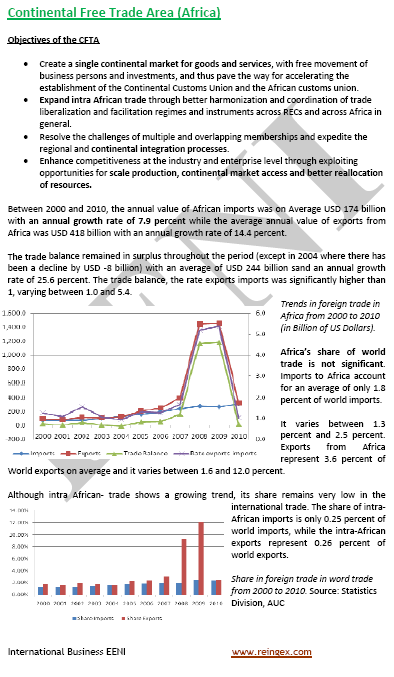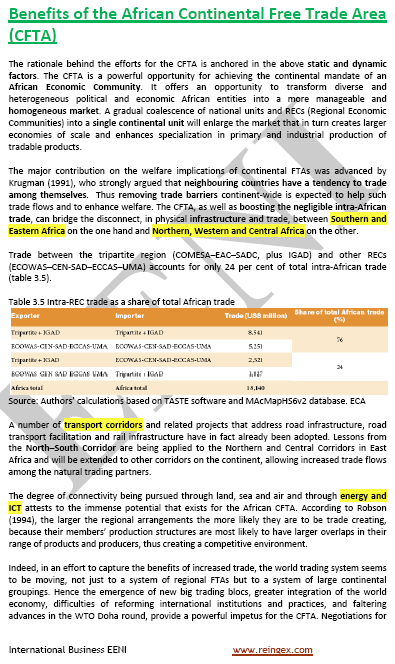
African Continental Free-Trade Area (AfCFTA)
Towards the African Free-Trade Area: 1 billion people, 1.2 trillion dollar

- Introduction to the African Continental Free-Trade Area (AfCFTA)
- Towards the African Continental Free-Trade Area (AfCFTA)
- Why Africa needs a Continental Free-Trade Area?
- Theories of Free-Trade Areas
- Main objectives of the African Continental Free-Trade Area
- Increase Intra-Africa Trade
- Benefits of the Continental Free-Trade Area for Africa
- Empirical Analysis of the CFTA (African Continental Free-Trade Area): economic gains and losses
- Economic impact of the African Continental Free-Trade Area
- Potential scenarios:
- South - Eastern FTA (COMESA, SADC, EAC, and IGAD) - Tripartite Agreement
- North - West - Central FTA (ECOWAS, CEN-SAD, ECCAS, and AMU)
- Economic impacts of the Continental Customs Union (2019)
- Perspectives of the African Continental Free-Trade Area
- Road Map and Architecture of the CFTA
- Bodies of the African Continental Free-Trade Area
The aims of the subject “African Continental Free-Trade Area (AfCFTA)” are the following:
- To understand the objectives of the African Continental Free-Trade Area
- To evaluate the advantages and the economic impact on African Countries of the African Continental Free-Trade Area
- To analyze the two possible scenarios for the realization of the African Continental Free-Trade Area
- To know the roadmap and architecture of the CFTA

The Subject “African Continental Free-Trade Area (AfCFTA)” belongs to the following Online Programs taught by EENI Global Business School:
Course: Regional Integration in Africa.
Masters: Transport in Africa, Business in Africa, International Business, Foreign Trade.

Doctorate: Global Logistics, African Business, World Trade.


EENI Partnerships with Educational Institutions
Languages:  or
or  Zone de libre-échange continentale africaine
Zone de libre-échange continentale africaine  Zona de Libre Comercio Africana
Zona de Libre Comercio Africana  Área de Livre Comércio Continental Africana.
Área de Livre Comércio Continental Africana.

African Continental Free-Trade Area (AfCFTA)
- Fifty-four countries
- 1 billion people
- Combined GDP: 1.2 trillion dollars.
Sample - African Continental Free-Trade Area

In 1962 was created the Organization of the African Union, one of his objectives was to search a socio-economic model for the Post-independence period with the vision: “Unity and Integration.”
In 1980 was adopted the Lagos Plan and in 1991 the Abuja Treaty with the aim of creating the African Economic Community in six phases in thirty-four years, where the Regional Economic Communities (REC) should play a fundamental role. In 2000 was set-up the African Union.
However, today, the vision of a “Pan-African Market Integration” has not achieved. By example, the intra-African trade represents only 10%.

66% of the African nations are limiting market access conditions, and protectionism is still predominant in the Government policies, mainly in the Agriculture sector.
In 2012, the African Union announced the Action Plan for Boosting Intra-African Trade with the aim to boost the intra-African trade by 35 billion dollars every year (mainly in agriculture and industrial products) and reducing the African imports from the world by 10 billion dollars.
The main objectives of the African Continental Free-Trade Area (AfCFTA) are:
- The creation of the Continental Customs Union (2019). Free Movement of people, products, services and investment
- To boost the intra-African trade
- To find a solution for the so-called “Spaghetti Bowl” and overlapping of roles and countries in the Regional Economic Communities
- To improve the African industry sector
The Tripartite FTA or OHADA are excellent examples of the benefits of the future African Continental Free-Trade Area (AfCFTA).
Today fifteen Regional Economic Communities are working for the Regional Integration in Africa:
- Community of Sahel-Saharan States
- Common Market for Eastern and Southern Africa (COMESA)
- East African Community
- Economic Community of Central African States
- Economic Community of West African States
- Intergovernmental Authority on Development
- Southern African Development Community
- Arab Maghreb Union
- Southern African Customs Union
- Mano River Union
- Indian Ocean Commission
- West African Economic and Monetary Union
- West African Monetary Zone
- Conference on the Great Lakes
- Central African Economic and Monetary Community.
The Economic Commission for Africa identifies two scenarios:
1) The first group formed by the FTA- Tripartite Agreement (or South East Group) countries:
- COMESA
- EAC
- SADC
2) The second group (North-West-Central Africa) formed by
- ECOWAS
- CEN-SAD
- ECCAS
- AMU
Moreover, finally, the merger of these two groups into the African Continental Free-Trade Area (AfCFTA).

(c) EENI Global Business School (1995-2024)
We do not use cookies
Top of this page

